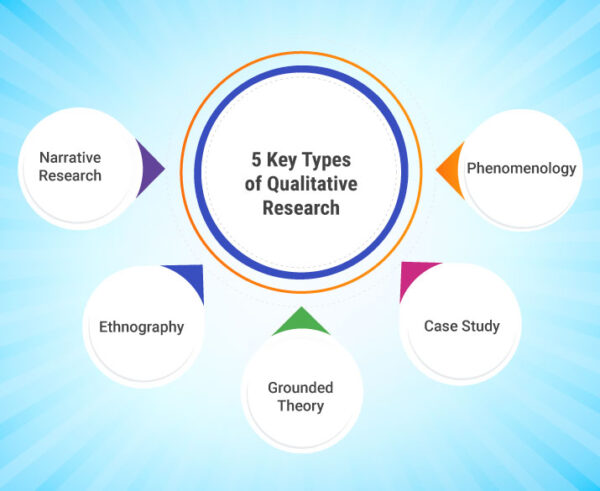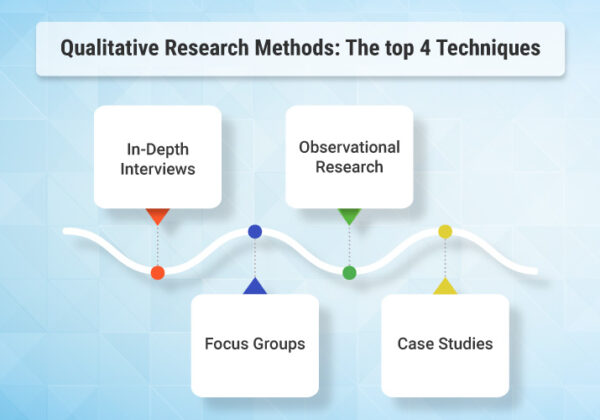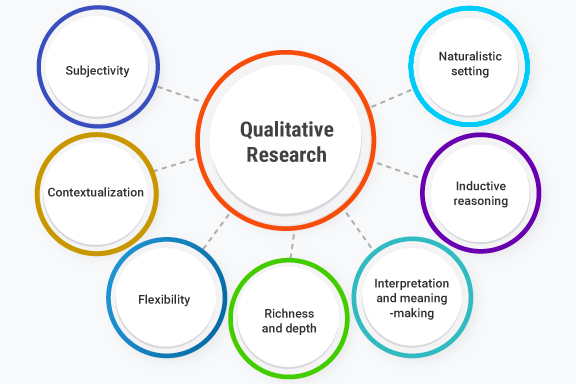Qualitative research is an essential method in understanding the nuances of human behavior, opinions, and experiences. While quantitative research focuses on numbers and statistics, qualitative research dives deep into the “why” and “how” behind the data. In this blog, we will explore the core principles of qualitative research, its design, and why it plays a critical role in uncovering meaningful insights.
What is Qualitative Research?
Qualitative research is a scientific method used to gather non-numerical data. Rather than focusing on measurements or metrics, qualitative research seeks to understand concepts, experiences, or phenomena by exploring participant perspectives. This method is often employed in fields like psychology, sociology, and marketing to gain deeper insights into consumer behavior, motivations, and cultural trends.
Qualitative research is defined as a method of inquiry that focuses on understanding the meaning of human experiences and social phenomena through interviews, observations, and analysis of text and visual data. Unlike its counterpart, quantitative research, which seeks to quantify data, qualitative research prioritizes depth over breadth.
Here are the key characteristics of Qualitative Research:
- Subjectivity: Qualitative research acknowledges the subjective nature of human experiences and perceptions. It recognizes that individuals interpret and construct meaning based on their unique perspectives, cultural backgrounds, and social contexts. Researchers using qualitative methods aim to capture this subjectivity by engaging in detailed qualitative observations, interviews, and analyses that capture the nuances and complexities of human behavior.
- Contextualization: Qualitative research places a strong emphasis on the context in which social phenomena occur. It seeks to understand the interconnectedness between individuals, their environments, and the broader social structures that shape their experiences. Researchers delve into the specific settings and circumstances that influence the behavior and attitudes of participants, aiming to unravel the intricate relationships between different variables.
- Flexibility: Qualitative research is characterized by its flexibility and adaptability. Researchers have the freedom to modify their research design and methods during the course of the study based on emerging insights and new directions. This flexibility allows for iterative and exploratory research, enabling researchers to delve deeper into the subject matter and capture unexpected findings.
- Interpretation and meaning-making: Qualitative research recognizes that meaning is not fixed but constructed through social interactions and interpretations. Researchers engage in a process of interpretation and meaning-making to make sense of the data collected. This interpretive approach allows researchers to explore multiple perspectives, cultural influences, and social constructions that shape participants’ experiences and behaviors.
- Richness and depth: One of the key strengths of qualitative research is its ability to generate rich and in-depth data. Through methods such as interviews, focus groups, and participant observation, researchers can gather detailed narratives and descriptions that go beyond surface-level information. This depth of data enables a comprehensive understanding of the research topic, including the underlying motivations, emotions, and social dynamics at play.
- Inductive reasoning: Qualitative research often employs an inductive reasoning approach. Instead of starting with preconceived hypotheses or theories, researchers allow patterns and themes to emerge from the data. They engage in iterative cycles of data collection and analysis to develop theories or conceptual frameworks grounded in the empirical evidence gathered. This inductive process allows for new insights and discoveries that may challenge existing theories or offer alternative explanations.
- Naturalistic setting: Qualitative research frequently takes place in naturalistic settings, where participants are observed and studied in their everyday environments. This setting enhances the ecological validity of the research, as it allows researchers to capture authentic behaviors, interactions, and experiences. By observing individuals in their natural contexts, researchers can gain a deeper understanding of how social phenomena unfold in real-world situations.
Why is Qualitative Research Important?
Qualitative research provides unique insights that quantitative research cannot. By exploring why people behave in a certain way or how they feel about a product or service, businesses can tailor their innovations to meet real-world demands. For example, in IdeaScale’s innovation management platform, qualitative research can help organizations crowdsource ideas and gain valuable feedback on new products or services.
Learn more: What is Qualitative Observation?
5 Key Types of Qualitative Research

Here are the 5 key qualitative research types that are employed in studies:
1. Phenomenology: This type of research focuses on understanding the essence and meaning of a particular phenomenon or experience as perceived by individuals who have lived through it. It seeks to capture the subjective experiences and perspectives of participants.
2. Ethnography: Ethnographic research involves immersing oneself in a specific cultural or social group to observe and understand its practices, customs, beliefs, and values. Researchers spend extended periods of time within the community to gain a holistic view of its way of life.
3. Grounded Theory: Grounded theory aims to generate new theories or conceptual frameworks based on the analysis of data collected from interviews, observations, or documents. It involves systematically coding and categorizing data to identify patterns and develop theoretical explanations.
4. Case Study: In a case study, researchers conduct an in-depth examination of a single individual, group, or event to gain a detailed understanding of the subject of study. This approach allows for rich contextual information and can be particularly useful in exploring complex and unique cases.
5. Narrative Research: Narrative research focuses on analyzing the stories and personal narratives of individuals to gain insights into their experiences, identities, and sense-making processes. It emphasizes the power of storytelling in constructing meaning.
Examples of Qualitative Research
1. In-depth Interviews in Marketing
A company wants to launch a new product and conducts in-depth interviews with potential customers. By asking open-ended questions about their preferences, needs, and experiences, the researchers gain rich insights into consumer expectations and sentiments. This data helps shape the product’s features and marketing strategy.
2. Focus Groups in Product Development
A tech firm conducts focus groups to discuss a new app. Participants share their opinions about features, usability, and design. The qualitative data gathered informs the development team about what users truly value, leading to a more user-friendly final product.
3. Ethnographic Studies in Healthcare
Researchers observe patients and healthcare providers in a hospital setting to understand the dynamics of care delivery. This ethnographic study reveals barriers to communication and identifies opportunities for improving patient experiences, ultimately guiding policy changes.
4. Content Analysis in Social Research
A study examines social media posts about a specific event or trend. By analyzing the content, researchers gain insights into public sentiment, social dynamics, and cultural attitudes. This qualitative analysis helps organizations understand how their messaging aligns with public perception.
5. Case Studies in Education
An education researcher conducts a case study on a particular school implementing a new teaching methodology. Through interviews and classroom observations, the researcher documents the effects on student engagement and learning outcomes. These findings can inform future educational strategies.
Example of Qualitative Research: A Comprehensive Case Study
One compelling example of qualitative research is a case study conducted by a nonprofit organization to explore the impact of its community programs. Researchers interviewed program participants, staff, and community stakeholders to gather their insights on the program’s effectiveness.
The findings revealed:
- Enhanced Community Engagement: Participants reported a sense of belonging and increased involvement in community activities.
- Skill Development: Many individuals highlighted how the programs helped them acquire new skills, boosting their confidence and employability.
- Suggestions for Improvement: Qualitative feedback offered specific suggestions for program enhancements, guiding future initiatives.
By utilizing qualitative methods, the nonprofit could better understand its impact and areas for growth, ultimately improving its offerings and community support.
Learn more: What is Qualitative Market Research?
Qualitative Research Methods: The Top 4 Techniques

Here are the best qualitative research methods that offer unique advantages in capturing rich data, facilitating in-depth analysis, and generating comprehensive findings:
1. In-Depth Interviews
One of the most widely used qualitative research techniques is in-depth interviews. This method involves conducting one-on-one interviews with participants to gather rich, detailed information about their experiences, perspectives, and opinions. In-depth interviews allow researchers to explore a participant’s thoughts, emotions, and motivations, providing deep insights into their behavior and decision-making processes. The flexibility of this method allows for the exploration of individual experiences in great detail, making it particularly suitable for sensitive topics or complex phenomena. Through careful probing and open-ended questioning, researchers can develop a comprehensive understanding of the participant’s worldview, uncovering hidden patterns, and generating new hypotheses.
2. Focus Groups
Focus group research involves the gathering of a small group of individuals (typically 6-10) who share common characteristics or experiences. This method encourages participants to engage in open discussions facilitated by a skilled moderator. Focus groups offer a dynamic environment that allows participants to interact, share their perspectives, and build upon each other’s ideas. This method is particularly useful for exploring group dynamics, collective opinions, and societal norms. By observing interactions within the group, researchers can gain valuable insights into how social influences shape individual attitudes and behaviors. Focus groups also allow for the exploration of diverse viewpoints, enabling researchers to identify patterns, contradictions, and shared experiences.
3. Observational Research
Observational research involves systematically observing and documenting participants’ behaviors and interactions within their natural environments. This method provides researchers with a direct window into real-life contexts, allowing for a comprehensive understanding of social interactions, cultural practices, and behavioral patterns. Whether conducted through participant observation or unobtrusive observation, this method eliminates the potential biases associated with self-reporting, as participants’ actions speak louder than words. Observational research is especially valuable in studying nonverbal communication, contextual factors, and complex social systems. It can also provide insights into unarticulated behaviors or experiences that may be difficult to capture through other methods. However, careful planning, ethical considerations, and the need for prolonged engagement are crucial for conducting successful observational research.
4. Case Studies
Case studies involve an in-depth examination of a specific individual, group, organization, or event. Researchers collect data through various sources, such as interviews, observations, documents, and artifacts, to construct a holistic understanding of the case under investigation. This method allows for an exploration of complex social phenomena in their real-life context, uncovering rich, detailed insights that may not be accessible through other methods. Case studies provide an opportunity to examine unique or rare cases, delve into historical contexts, and generate context-specific knowledge. The findings from case studies are often highly detailed and context-bound, offering rich descriptions and contributing to theory development or refinement.
Qualitative research methods offer a range of powerful tools for exploring subjective experiences, meanings, and interpretations. In-depth interviews allow for the exploration of individual perspectives, while focus groups illuminate group dynamics. Observational research provides a direct view of participants’ behaviors, and case studies offer a holistic understanding of specific cases. By leveraging these qualitative methods, researchers can unveil deep insights, capture complex phenomena, and generate context-specific knowledge.
Qualitative Research Best Practices
- Clear Research Objectives: Clearly define the qualitative research objectives, questions, or hypotheses that guide the study. This helps maintain focus and ensures that data collection and analysis are aligned with the research goals.
- Sampling Strategy: Select participants or cases that are relevant to the qualitative research questions and provide diverse perspectives. Purposeful sampling techniques, such as maximum variation or snowball sampling, can help ensure the inclusion of a wide range of experiences and viewpoints.
- Data Collection Rigor: Employ rigorous qualitative data collection techniques to ensure the accuracy, credibility, and depth of the findings. This may involve conducting multiple interviews or qualitative observations, using multiple sources of data, and taking detailed field notes.
- Ethical Considerations: Adhere to ethical guidelines and obtain informed consent from participants. Protect the privacy, confidentiality, and anonymity of participants and ensure their voluntary participation throughout the qualitative research process.
- Data Analysis: Utilize systematic and rigorous approaches to analyze qualitative research data. This may involve coding, categorizing, and identifying patterns or themes within the data. Software tools like NVivo or ATLAS.ti can assist in organizing and analyzing large datasets.
- Triangulation: Enhance the validity and reliability of the findings by employing triangulation. Triangulation involves using multiple data sources, methods, or researchers to corroborate and validate the results, reducing the impact of researcher bias.
- Member Checking: Share the preliminary findings with participants to verify the accuracy and interpretation of their data. Member checking allows participants to provide feedback and corrections, enhancing the trustworthiness of the research.
- Reflexive Journaling: Maintain a reflexive journal throughout the research process to record reflections, insights, and decisions made during data collection and analysis. This journal can serve as a valuable tool for ensuring transparency and traceability in the research process.
- Clear and Transparent Reporting: Present the research findings in a clear, coherent, and transparent manner. Clearly describe the research methodology, data collection, and analysis processes. Provide rich and thick descriptions of the findings, supported by direct quotations and examples from the data.
By following these best practices, qualitative researchers can enhance the rigor, credibility, and trustworthiness of their research, leading to valuable and meaningful insights into the complex phenomena under investigation.
Learn more: What is Customer Experience (CX) Research?
Most Recent Blogs
Explore the latest innovation insights and trends with our recent blog posts.










